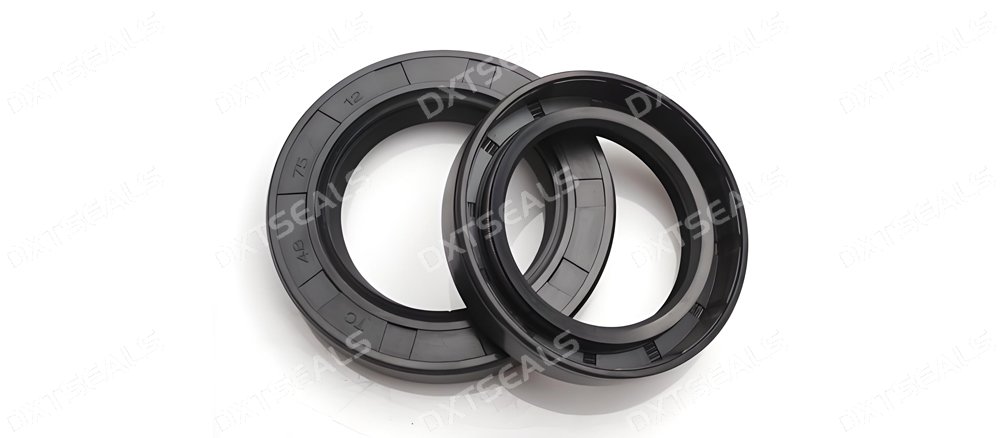
In industrial machinery, oil seals—also known as rotary shaft seals—play a critical role in preventing lubricant leakage and keeping contaminants out. Choosing the correct oil seal can significantly impact machine efficiency, service life, and maintenance frequency.
At DXTSEALS, we understand the challenges in selecting the right seal. This article introduces the main types of oil seals, compares their performance characteristics, and provides guidance to help you make the best choice for your application.
🔍 What Is an Oil Seal?
An oil seal is a mechanical component used to seal the gap between stationary and moving parts, usually around a rotating shaft. It helps:
-
Retain lubricants (oil or grease)
-
Prevent ingress of dust, water, and chemicals
-
Maintain pressure and protect internal components
Oil seals are widely used in automotive, agricultural, hydraulic, industrial, and marine equipment.
🧩 Common Types of Oil Seals
1. Single Lip Oil Seal
-
Structure: One sealing lip
-
Best for: Basic sealing applications
-
Pros: Cost-effective, simple installation
-
Limitations: Less effective in dirty or high-pressure environments
2. Double Lip Oil Seal (with Dust Lip)
-
Structure: One oil-sealing lip and one dust lip
-
Best for: Environments with dirt, dust, or light contaminants
-
Pros: Better protection, improved sealing lifespan
-
Limitations: Slightly higher friction than single lip
3. Spring-Loaded Oil Seal
-
Structure: Features a spring to maintain lip tension
-
Best for: High-speed rotation or pressure applications
-
Pros: Superior sealing force over time
-
Limitations: Slightly higher cost
4. Cassette Seal
-
Structure: Multiple sealing lips integrated into a single unit
-
Best for: Harsh, high-contamination applications (e.g., off-road or agricultural equipment)
-
Pros: Exceptional dirt and mud resistance, long service life
-
Limitations: Bulkier, more expensive
🧪 Comparison of Oil Seal Materials
| Material | Temp. Range | Chemical Resistance | Typical Use Cases |
|---|---|---|---|
| NBR (Nitrile) | -40°C to +100°C | Good for oil, fuel | Automotive, hydraulic systems |
| FKM (Viton®) | -25°C to +200°C | Excellent for heat, chemicals | Engines, gearboxes |
| HNBR | -40°C to +150°C | Good wear and ozone resistance | Refrigeration, transmission |
| PTFE | -60°C to +250°C | Excellent chemical & temperature resistance | Chemical plants, high-speed shafts |
| Silicone | -60°C to +200°C | Good for dry heat, limited chemical resistance | Food machinery, medical devices |
✅ Key Factors in Choosing the Right Oil Seal
To ensure long-term performance, consider these parameters when selecting an oil seal:
-
Operating Temperature
-
High temps require heat-resistant materials like FKM or PTFE.
-
-
Rotational Speed
-
High-speed shafts benefit from PTFE or spring-loaded seals.
-
-
Medium Being Sealed
-
Choose materials compatible with oil, fuel, chemicals, or water.
-
-
Contaminant Exposure
-
Use double-lip or cassette seals in dirty environments.
-
-
Pressure Level
-
Not all oil seals are pressure-rated. Verify seal limits or opt for pressurized seal designs.
-
⚙️ Industry Applications of Oil Seals
Oil seals are essential in a wide variety of machinery:
-
🚗 Automotive: Crankshafts, axles, gearboxes
-
🏗️ Construction Equipment: Hydraulic cylinders, drive systems
-
🚜 Agriculture: Tractors, combines, wheel hubs
-
🛠️ Industrial Machines: Pumps, motors, compressors
-
🧪 Chemical Equipment: High-resistance PTFE or FKM seals
🔩 Why Choose DXTSEALS?
At DXTSEALS, we offer a comprehensive range of customized oil seals designed for precision, durability, and extreme conditions. We support clients with:
-
✔ Tailor-made sealing solutions
-
✔ High-performance materials (FKM, PTFE, HNBR, etc.)
-
✔ Tight-tolerance CNC manufacturing
-
✔ Expert engineering consultation
-
✔ Competitive pricing and fast global delivery
📌 Conclusion
Choosing the right type of oil seal and material is crucial to ensure reliable performance in your equipment. Whether you need resistance to pressure, heat, chemicals, or contamination, understanding each seal’s characteristics can help you make faster and smarter decisions.
Let DXTSEALS help you find or design the perfect seal to optimize your operation.
🔗 Learn more at www.dxtseals.com or contact us for expert support.
